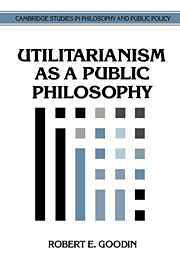Book contents
- Frontmatter
- Contents
- Preface
- Acknowledgments
- PART I INTRODUCTION: MORAL BASES OF STATE ACTION
- PART II MORALITY, PUBLIC AND PRIVATE
- PART III SHAPING PRIVATE CONDUCT
- PART IV SHAPING PUBLIC POLICIES
- 8 Liberalism and the best-judge principle
- 9 Laundering preferences
- 10 Heroic measures and false hopes
- 11 Theories of compensation
- 12 Stabilizing expectations
- 13 Compensation and redistribution
- 14 Basic income
- 15 Relative needs
- 16 What is so special about our fellow countrymen?
- 17 Nuclear disarmament as a moral certainty
- 18 International ethics and the environmental crisis
- References
- Name index
14 - Basic income
Published online by Cambridge University Press: 28 January 2010
- Frontmatter
- Contents
- Preface
- Acknowledgments
- PART I INTRODUCTION: MORAL BASES OF STATE ACTION
- PART II MORALITY, PUBLIC AND PRIVATE
- PART III SHAPING PRIVATE CONDUCT
- PART IV SHAPING PUBLIC POLICIES
- 8 Liberalism and the best-judge principle
- 9 Laundering preferences
- 10 Heroic measures and false hopes
- 11 Theories of compensation
- 12 Stabilizing expectations
- 13 Compensation and redistribution
- 14 Basic income
- 15 Relative needs
- 16 What is so special about our fellow countrymen?
- 17 Nuclear disarmament as a moral certainty
- 18 International ethics and the environmental crisis
- References
- Name index
Summary
Proposals to pay everyone in society a “basic income” are, on their face, straightforward. The same sum would be paid, absolutely unconditionally, to everyone in society – regardless of their work performance, income, needs or any other personal characteristics. Of course, people might supplement this basic income in various ways, typically with earned income. But it would make no difference to the “basic income” you receive whether you were young or old, in work or out of it, willing to work or unwilling or unable to do so, married or single, had dependents or not, or whatever. Every individual in society would be guaranteed the same basic sum, regardless.
Many arguments can be offered in support of such schemes of income support. Egalitarian aims are served by paying everyone the same sum, libertarian ones by giving them cash rather than end-use goods, civil-libertarian ones by making the grant unconditional and hence immune to official inquiries concerning people's personal circumstances. True and important though all that may be, I want to focus in this chapter on another equally compelling but less familiar rationale.
The crux of my case is that schemes paying everyone an unconditional basic income are less presumptuous than more conditional programs of income support. Not only are they less prying and intrusive, less demeaning and debasing. More to the point of my present argument, they also simply make fewer assumptions and presumptions about those whom they are aiding.
- Type
- Chapter
- Information
- Utilitarianism as a Public Philosophy , pp. 228 - 243Publisher: Cambridge University PressPrint publication year: 1995

